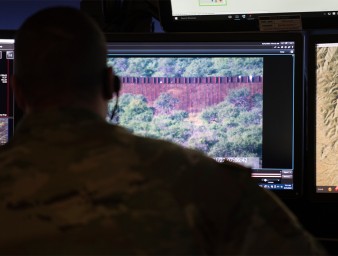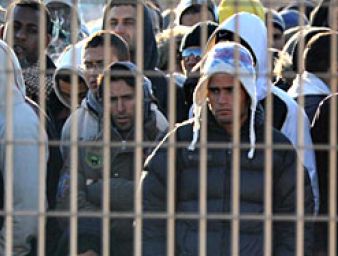Darien Gap: a risky path in search of a safer life
05 September 2023

It is just after ten o'clock in the morning when dozens of exhausted faces start to appear. They have just disembarked from the slender and colourful traditional canoes belonging to the indigenous communities, only equipped with motors a few years ago.
They are girls, boys, women, men, and babies who have just spent four hours crossing the Chucunaque River, in Panama, thus completing one of the most traumatic experiences of their lives.
But it is only the first of many challenging stages they will have to overcome before they reach their destination.
They come from Venezuela, Haiti, Ecuador, Colombia, China, and a myriad of other origins. They say they decided to flee violence, insecurity, lack of freedom and misery, and are travelling across half the American continent in search of a dignified future where they can live in freedom and where their fundamental rights are respected.
They have just passed one of the toughest tests of their journey: crossing the Darién Gap, a 575,000 hectares expanse of tropical jungle which separates Colombia and Panama.
"They stole everything from us. A group of armed men with balaclavas held us hostage for a day, and took everything from us - our money, our belongings and even our food. A group of Haitians gave us something to eat," says Catherine from Venezuela. She is at the Lajas Blancas temporary migration centre in Panama's Darién region, where she is trapped with her husband and her children aged 13, 11 and 9.
"We saw many dead bodies floating in the river," says Catherine. She does not know how she will be able to continue her journey because she has no money, but says, "at least they didn't touch my daughter.”
The UN Human Rights Office highlighted the risks and vulnerabilities faced by an unprecedented number of migrants and refugees who are crossing the Darien Gap – the dense tropical jungle that separates Colombia and Panama – on their journey towards North America.
So far this year, more than 330,000 people have crossed the Darien Gap – the highest annual figure recorded to date. One in five were children. By comparison, some 248,000 people are estimated to have passed through this region during the whole of 2022.
“Migrants and refugees are exposed to multiple human rights violations and abuses during their journey, including sexual violence, which is a particular risk for children, women, LGBTI people and people with disabilities. There are also murders, disappearances, trafficking, robbery, and intimidation by organised crime groups,” UN Human Rights Office spokesperson Marta Hurtado told the biweekly press briefing in Geneva.
A litany of deadly risks
Sexual violence is one of the many difficulties facing people crossing the jungle - especially women and LGBTI people. In addition, a report of the Human Rights Committee in March this year also found further risks including murders, disappearances, trafficking, robbery, and intimidation by organised crime operatives.
These risks are compounded by the inherent dangers of crossing a tropical jungle. Migrants faced wild and venomous animals, climb hills and cross fast-flowing rivers. In the dry season, they have had to walk an average of 4-7 days. In the rainy season, which lasts nine months, the mud makes the trek even more difficult, accidents are more frequent and the journey can take up to 10 days.

Newly arrived migrants having bags searched and are registered by agents from the National Border Service at the intake centre. © Carlos Rodriguez/ROCA
"The worst thing for me, as I don’t know how to swim, was to see people drowning, and falling down ravines. I don't know how many dead bodies I've seen," said Felix from Venezuela.
Benjamín Rodriguez, human rights officer from the Panamanian Ombudsman's Office, listens to and documents these stories. The Ombudsman’s Office works closely with the Regional Office for Central America and the Caribbean of the UN Human Rights Office (ROCA), based in Panama City.
Dialogue and working with officials are essential in helping migrants, said Andrea Ospina from ROCA’s migration team. Through training, capacity building and studies – all supported by the Office – a clearer idea of the concrete needs and means to guarantee rights is developed, she said.
"We are working with the Human Mobility Group of the United Nations System in Panama as well a with the Panamanian authorities to develop a contingency plan to be activated at times like this when there is an exponential increase in the number of migrants," Ospina said.
Migrant flow increases six-fold
The number of migrants travelling through the Darién has been on the increase. Between 2010 and 2020, some 120,000 people crossed through the thick jungle. During 2022 alone, there were more than 248,000 people.
The decreasing access to visas in the region, paired with other restrictions and new migration policies, has forced migrants to seek more dangerous routes, including crossing the Darién.
Currently, Panamanian authorities are recording between 1000 and 2000 people crossing the Darién every day, more than six times the figure for the same period last year.
"This means between 80 and 100 canoes carrying about 25 people each are arriving at the Lajas Blancas temporary migrant centre every day," said Rodriguez, as he collected complaints and answers questions from migrants who had just disembarked.
Gallery: Making the Journey

A boat arrives with migrants making the final crossing to the intake center in Panama. Many of the boats are piloted by indigenous people, who have stopped doing necessary work to cater to the migrants. © Carlos Rodriguez/ROCA

Once off the boats, migrants are met by agents from the National Border Service, who ask their nationality. © Carlos Rodriguez/ROCA

Migrants arrive with what they can carry, including their small children. © Carlos Rodriguez/ROCA

© Carlos Rodriguez/ROCA

People waiting in line for the second meeting with the National Border Service as well as to see medical professionals from Doctors without Borders. © Carlos Rodriguez/ROCA

Once off the boats, migrants are met by agents from the National Border Service, who ask their nationality. © Carlos Rodriguez/ROCA
People receive very little information when they get out of their canoes. Agents from the National Border Service line them up and ask them their nationality. There are a few signs in Spanish, English, Arabic, Chinese and even Creole, but not enough to explain what to do. Information is mainly passed on by word of mouth.
At the Lajas Blancas temporary migrant centre, there were two medical posts, one run by the Red Cross, the other by Doctors Without Borders. However, they are located on the other side of the Panamanian authorities' second checkpoint, a mandatory registration that forces migrants to queue for long periods of time. These checks apply without exception, whether you have a broken ankle, or are carrying a baby like Dylan, a four-week-old Venezuelan who has spent a quarter of his short life in the middle of the jungle, and who was showing clear signs of hypothermia.
This constant flow of people has had a major impact on the region, especially in the small indigenous communities through which the migrants pass, most of them with populations of no more than 300. The indigenous people sell everything from water and food to space under their houses and electricity to charge mobile phones.
"Many of the indigenous people who pilot the canoes have stopped doing other necessary work; children don't go to school because they help their parents sell products for the migrants," said Rodriguez.
"Horrible” journeys, uncertain futures
The backgrounds of the people who cross the Darién are varied, although the vast majority pay someone to guide them through the jungle.
Jinau from Haiti disembarked from a canoe with his wife and three daughters - three-year-old twins with Brazilian nationality and an infant, born two months ago in Chile.
"We arrived in Brazil in 2017 and the twins were born there. But then I couldn't find any more work and we went to Chile, where the little one was born. But then things got bad again and we decided to emigrate for the third time," he said.
Jinau’s case is not an isolated one; many migrants held residence visas in a South American country, but their precarious living conditions pushed them to continue north.

OHCHR Human Rights Andrea Ospina, speaks with and officer from the Defensoría del Pueblo de Panamà at boat landing point. © Carlos Rodriguez/ROCA
Within the framework which the Panamanian authorities call the "controlled flow" of migrants, once they have entered the temporary migrant reception centre, those who can afford to pay 40 dollars per head - including for children – have had to queue again to get a private bus. This bus will take them to Planes de Gualaca, another temporary migration centre, on the border with Costa Rica. Most do not even stop to receive the free food distributed at the centre.
Many others don’t have enough money.
"The journey with the children was horrible, going hungry, drinking the dirty river water. I have never walked so much,” said Yeneville who is Venezuelan. “My daughter Richeli, who is three years old, got diarrhoea, but when I got here, they gave me medicine and she is better now. But now we have no way to leave, we have nothing to sell, I don't know what we're going to do.”
The situation has led to the creation of a subsistence economy in which everything is bought and sold: food, clothes, cigarettes, money transfers, tents, and even women's bodies.
Various mechanisms of the human rights system, such as the Special Procedures, the UN Human Rights Committee, the UN Committee on the Elimination of Discrimination against Women and the UN Committee on Economic, Social and Cultural Rights have issued reports warning that reception conditions are far from adequate. They have also alerted of cases of physical and sexual violence and made recommendations on how to remedy the situation.
ROCA is working with the authorities to provide them with technical assistance on how to implement these recommendations more effectively.
Recently, a team from ROCA accompanied the National Mechanism against Torture in its visit to the reception centres for migrants, during which the issue of unaccompanied minors in detention was discussed. One in five migrants crossing the Darién is a minor.
ROCA is also working in collaboration with the Public Prosecutor's Office on the creation of a Protocol for Access to Justice for Migrants. This would ensure that prosecutors can receive and follow up on all complaints, especially of sexual violence.
"Attention and access to justice for victims of sexual violence is essential. We are working hard to guarantee this fundamental human right," Ospina explained.
The Office is also currently developing a tool to collect, classify and store quickly, effectively and in real time all data on human rights violations that the authorities are aware of. This tool will be at the disposal of the Ombudsman's Office.
"Without data and without concrete and accurate information, it is not possible to carry out a detailed analysis of what is happening nor is it possible to define strategies for action," she said.
Troubles worth the journey
No one talks about what is still to come. Thousands of kilometres through five other countries until they reach the border with the United States, where they once again may face rough conditions, bad weather, organised crime, and state-imposed restrictions.
Migrants’ access to resources will not only determine the speed of their transit through the reception centres in Darién and towards the Costa Rican border, but it will also determine the difficulty of their journey through the jungle. Organised crime groups offer "packages" whereby migrants who pay between 350 and 500 dollars will be escorted through the easiest route. Experts said many Chinese migrants use this method.
This was the case for Bogto, a young Chinese man we spoke to at San Vincente reception centre. He travelled from China to Turkey to Bogotá to Ecuador by plane, and from Quito to Darién on foot.
"I want to get to the United States, like everyone else here, and live the American dream. The journey has been hard, but it will be worth it.”
This is not the opinion of Adileidis from Venezuela.
"The journey was horrible, much worse than I could have ever imagined. And the worst thing is that nobody tells you how awful it is going to be. If I had known, I wouldn't have done it.”



